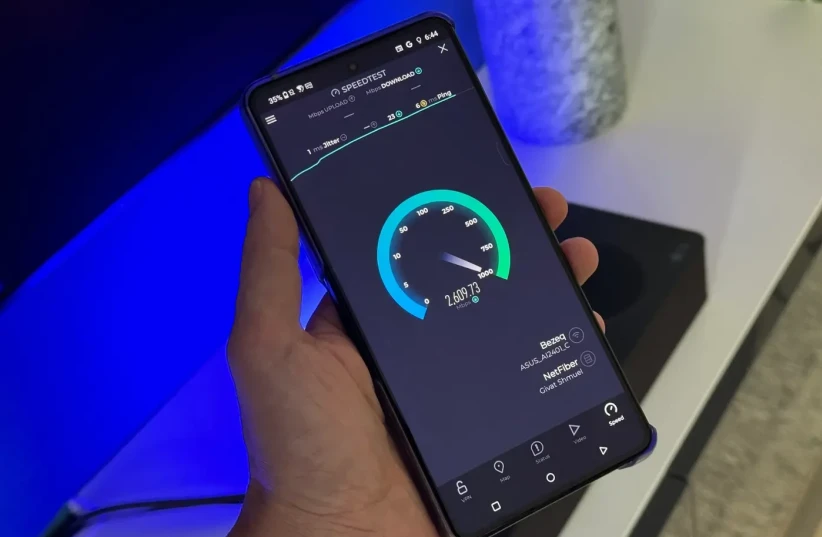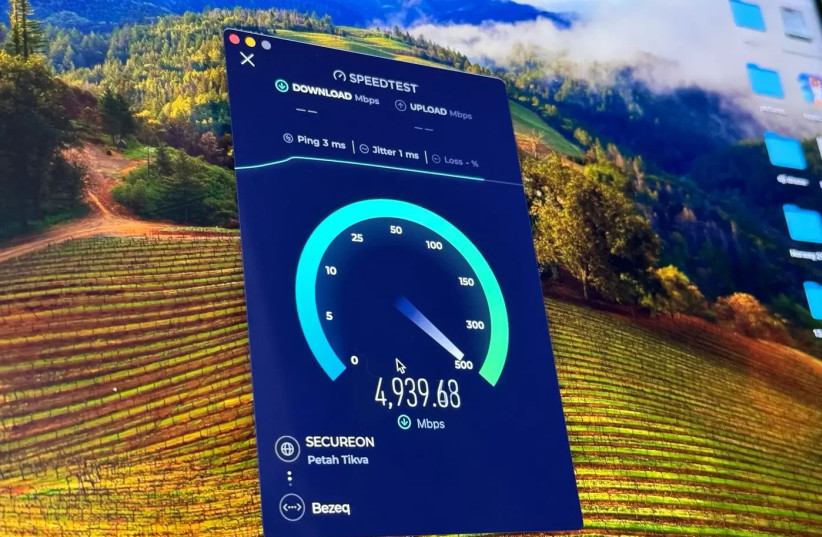Bezeq, Israel's veteran telecommunications company, isn't resting on its laurels. As part of the ongoing race to provide the fastest internet and compete with other service providers, we at Walla Technology received a special connection to their new fiber-optic network - offering a staggering speed of 5 gigabits per second (5,000 megabits per second).
Installation
The connection process at home was simple and efficient. A Bezeq technician arrived with the new modem (Be Multi Fiber), which supports WiFi 7 (we'll explain what that is shortly), and installed it in a short time. About an hour in total, no drama.
What about those without existing fiber connections at home? In such cases, a common issue mainly in older buildings or private apartments, the installation will also involve laying fiber-optic infrastructure - a more complex process that might affect installation costs and time.
There's WiFi 7
Support for WiFi 7 is one of the impressive features of the new modem (Be Multi Fiber). For those who don't understand: the technology enables exceptionally high speeds in supported devices, more stable transmission, and reduced latency, making browsing faster. In fact, another significant advantage of the Be Multi Fiber is its ability to support a stable connection of up to 300 devices simultaneously, making it ideal for homes packed with smart devices.
How dramatic is this compared to the previous generation? In data transfer speed - 4.8 times faster than WiFi 6, and 15 times faster than WiFi 5. However, even if your device doesn't support the new standard (like the iPhone 15 series), don't worry, you'll still get very fast internet, though not at the full potential.
Peak Speed
Here, my memory takes me back to around 2006, when internet connection was via dial-up, and providers boasted speeds of 8 and 10 megabits. Downloading a movie or series was an entire project that began on Thursday, hoping we could watch it by Saturday night, provided no one overloaded the connection with another download in the background. In short, a nightmare.
And today? Thanks to WiFi 7, supported devices like the Galaxy S24 or the Asus ROG Phone 8 soar forward with impressive download speeds of up to 2.5 gigabits per second and an upload rate of about 500 megabits. But that's not all - directly connecting our computers and devices via a network cable elevated us to ultra levels, with a maximum download speed of 5 gigabits per second and an upload speed of around 500 megabits.
Who Needs Ultra-Fast Internet?
Let's start with the bottom line: I didn't feel a significant difference between the fast internet installed at my home, with a speed of 1 gigabit, and a connection speed of 5 gigabits. And where is there a difference? In the smart home. I have 20 electronic friends there, constantly communicating - lights, cameras, TV, water heater, blinds, vacuum robot... basically, a celebration. With 1 gigabit, sometimes the network was a bit congested, things were slow, sometimes even disconnected. So 5 gigabits? Zero disconnections, no slowdowns, no frustration. Music flows, movies fly, and the vacuum robot works without getting upset (well, almost).
In fact, Bezeq's launch comes at a critical time, as consumer needs change rapidly and the demand for higher speeds increases. With the introduction of more and more smart devices at home, streaming services broadcasting content in 4K (soon we'll get 8K too), and increasing demand for a smooth and fast user experience, Bezeq offers a suitable and updated solution. Do we all really need such speed? It depends.
But the truth must also be told - not everyone needs a 5 gigabit internet speed at home. Browsing, streaming, and remote work are well managed with less. Essentially, Bezeq is planning ahead, for a future of artificial intelligence, smart homes, and the Internet of Things, days when many devices will be connected and require real-time data. And for all this to work properly, we will need a strong and stable home network.

